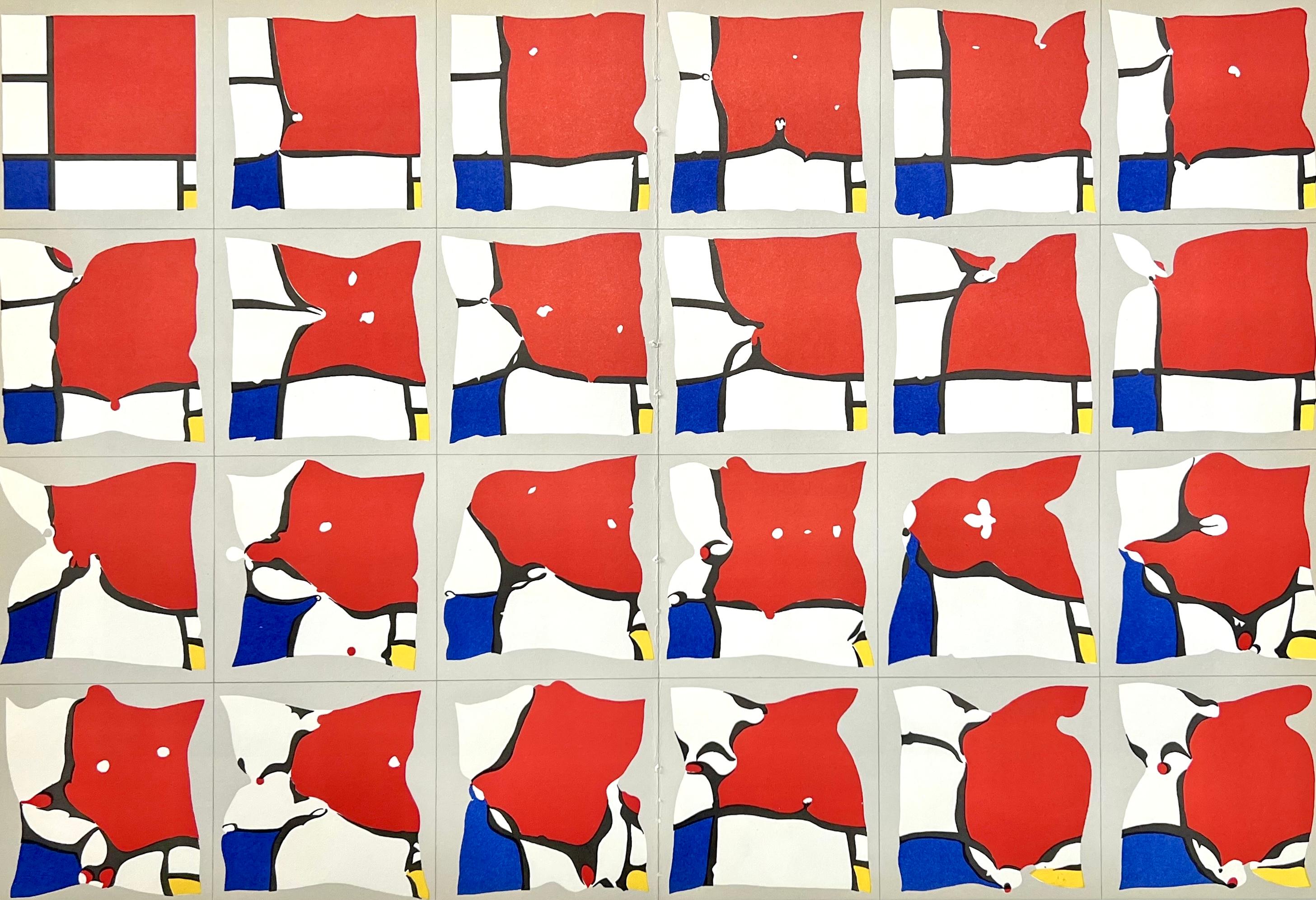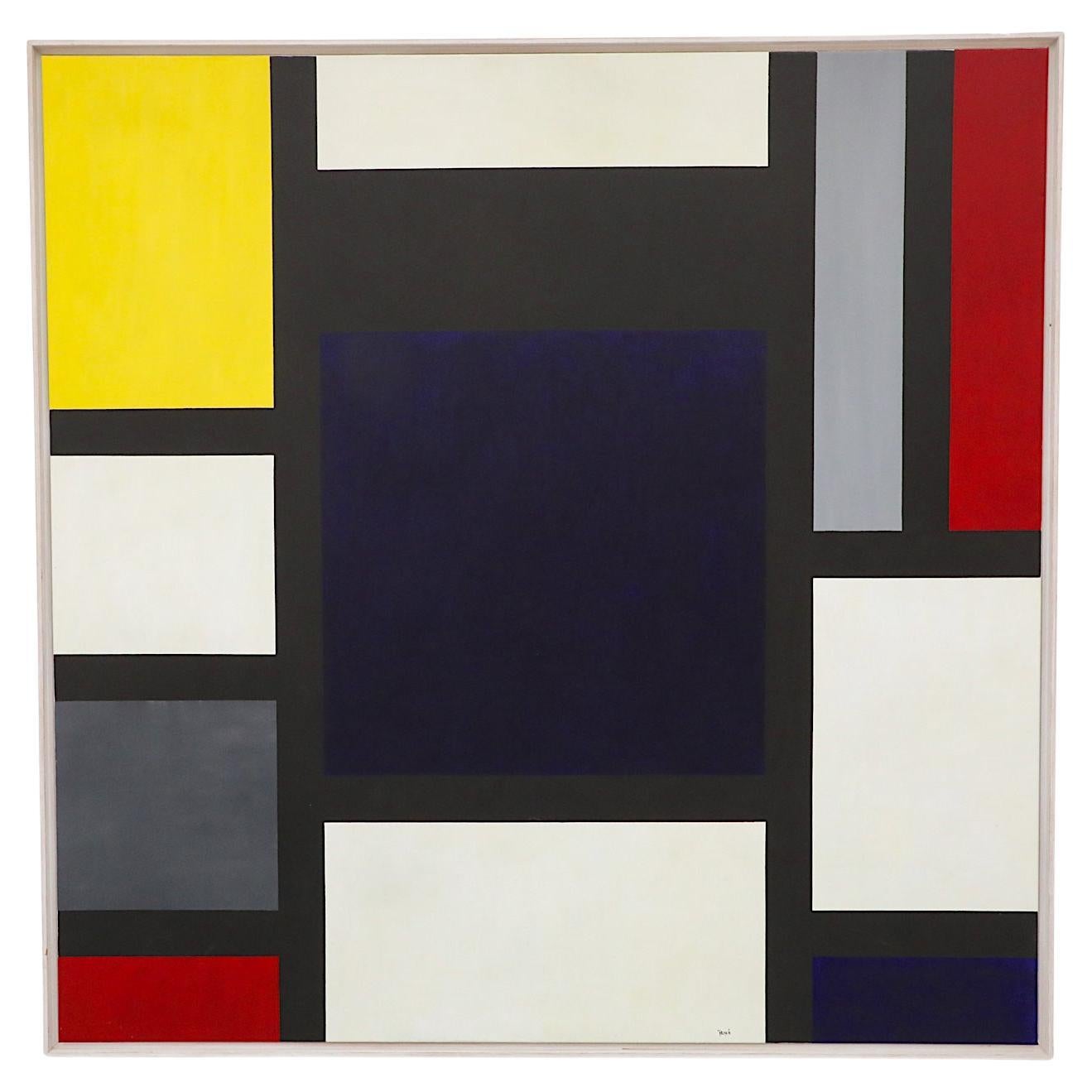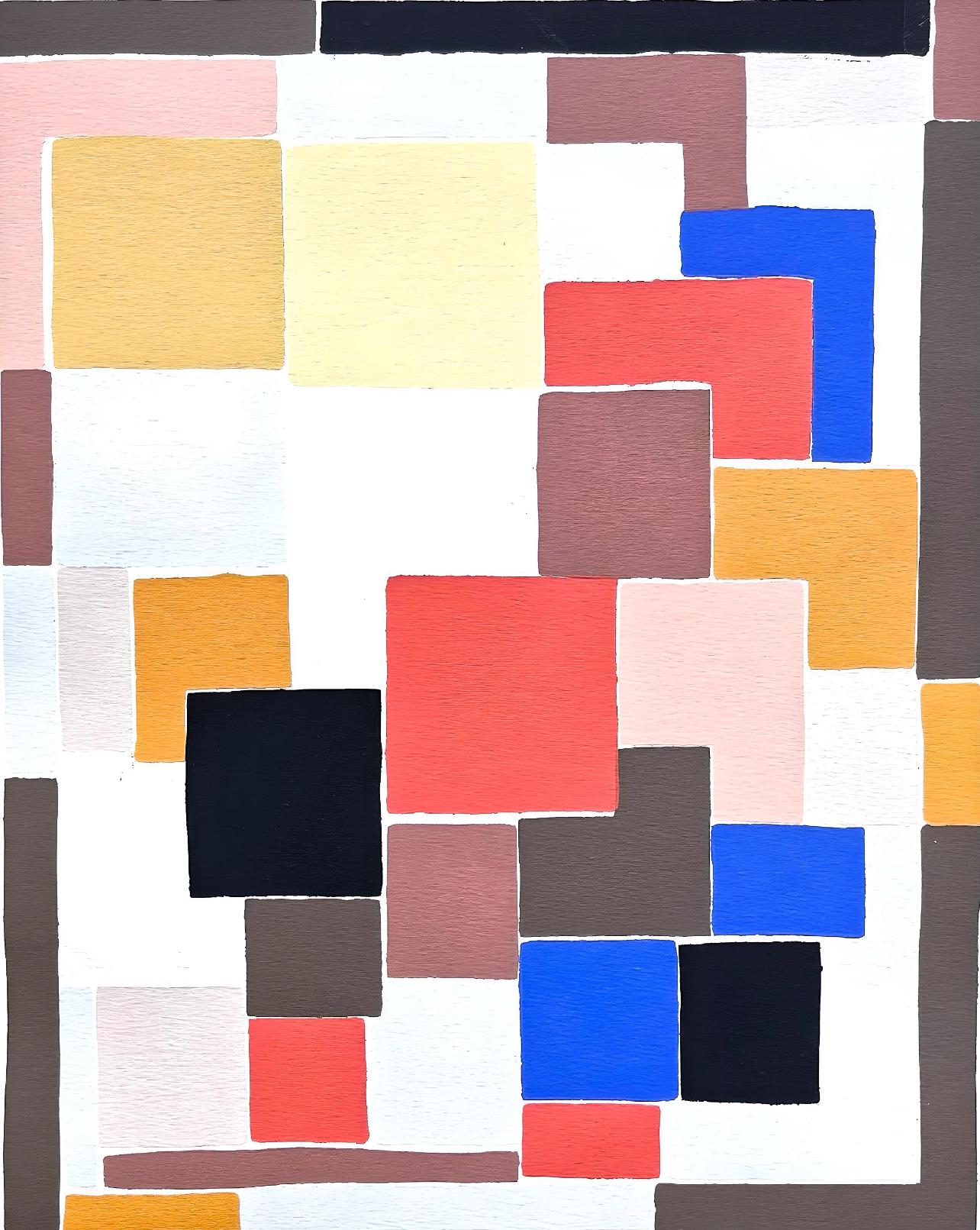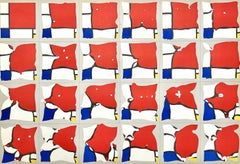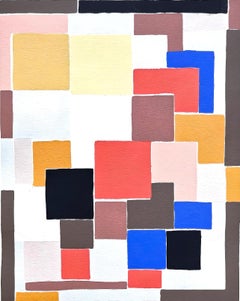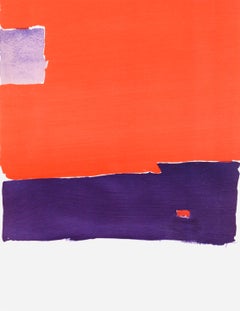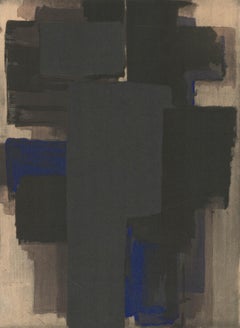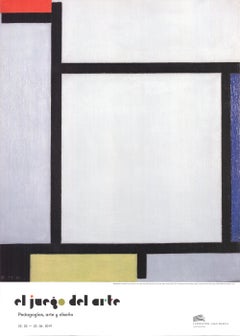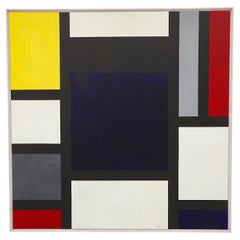Items Similar to Mondrian, Sans titre, Société internationale d'art XXe siècle (after)
Want more images or videos?
Request additional images or videos from the seller
1 of 7
Mondrian, Sans titre, Société internationale d'art XXe siècle (after)1957
1957
$1,996
$2,49520% Off
£1,548.88
£1,936.1020% Off
€1,748.79
€2,185.9820% Off
CA$2,856.09
CA$3,570.1120% Off
A$3,116.52
A$3,895.6420% Off
CHF 1,612.39
CHF 2,015.4820% Off
MX$37,282.89
MX$46,603.6120% Off
NOK 20,368.29
NOK 25,460.3620% Off
SEK 19,125.51
SEK 23,906.8820% Off
DKK 13,060.32
DKK 16,325.4020% Off
About the Item
Lithograph, stencil on vélin paper. Paper Size: 12.4 x 9.65 inches. Inscription: Signed in the plate and unnumbered, as issued. Notes: From the album, XXe siècle, Nouvelle série N° 9 (double) Juin 1957, Cahiers d'Art publiés sous la direction de Gualtieri di San Lazzaro, 1957. Published by Société Internationale d'Art XXe siècle, Paris, under the direction of Gualtieri di San Lazzaro, éditeur, Paris; printed by Atelier Jacomet, Paris, under the direction of Daniel Jacomet, Paris, 1957. Additional notes: Excerpted from the academic article, “Promoting Original Prints, The Role of Gualtieri di San Lazzaro and XXe Siècle” by Valerie Holman, published in Print Quarterly, XXXIII, 2016, 2, Until recently very little has been written on the Italian author and art publisher Gualtieri di San Lazzaro (1904-75), yet for 50 years he chronicled the life and work of contemporary artists, produced monographs of exceptional quality, and disseminated original prints by modern painters and sculptors through his best-known periodical, XXe Siècle. Although still a relatively unfamiliar figure in the United Kingdom, San Lazzaro is one of the half-dozen great art publishers of the mid-twentieth century who, together with his exemplar, Ambroise Vollard (1866-1939), and those of his own generation, Christian Zervos (1889-1970), Tériade (1889-1983) and Albert Skira (1904-73), chose to base himself in Paris, seeing it throughout his life as the centre of the art world….XXe Siècle, an illustrated periodical, was launched in 1938 and printed in editions of approximately 2,000, each issue containing both photographs and four-colour separation reproductions across a wide spectrum of visual imagery ranging from masterpieces of Western painting to popular prints from the Far East. Its large format, lively design, and close integration of text and image, were immediately striking, but its most innovative feature, introduced at the suggestion of Hans Arp (1886-1966), was the inclusion of original prints by contemporary artists in every issue. With obvious appeal for collectors, XXe Siècle was also designed to introduce a wider, international public to contemporary painting and sculpture through good quality colour reproductions and the immediacy of original prints. Comparable in price to Cahiers d'Art, early issues of XXe Siècle sold out rapidly. While San Lazzaro's own aesthetic preferences tended towards lyric abstraction, he made clear that XXe Siècle was non-partisan [publication ceased during World War II]….in 1951, San Lazzaro relaunched XXe Siècle with thematic issues that were materials based, or centred on a topic of current interest in the visual arts, particularly in Europe: concepts of space, matter, monochrome, mark-making and the sign.' A defining feature of the new series was Italy's artistic dialogue with France for, while San Laz-zaro had originally concentrated on Paris-based painters and sculptors, his aim was to create an international network, to make known the work of French artists in Italy and Italian artists in France, and subsequently extend this bilateral axis to the English-speak-ing world. The artists represented in No. I by an original print were all best known as sculptors: Arp, Laurens, Henry Moore (1898-186) and Marino Marini, San Lazzaro not only sought to show readers the full range of an artist's work, but to encourage the production of prints, a stimulus much appreciated, for example, by Magnelli…. Suffering from failing health, in 1968 San Lazzaro lost overall control of XXe Siècle to Léon Amiel, a printer-publisher who had provided financial backing and helped with distribution in America." Thematic issues now ceased and were replaced by a 'panorama' of the year, but San Lazzaro was still active as a publisher of books and albums of prints….Shortly after his death, San Lazzaro himself was the subject of two exhibitions: 'Omaggio a XXe Siècle' in Milan in December 1974 centred on graphic work by those artists closest to him late in life, while 'San Laz-zaro et ses Amis' at the Musée d'Art Moderne de la Ville de Paris in 1975 featured work by all those whose work he had promoted for more than 50 years: Arp, Calder (1898-1976), Capogrossi, Chagall, Sonia Delau-nay, Dubuffet, Estève, Lucio Fontana (1899-1968), Gili-oli (1911-77), Magnelli, Marini, Miró, Moore and Poliakoff. This exhibition was seen by one of his closest colleagues as an indirect portrait of San Lazzaro, a complex man whose modesty and reserve masked his unremitting drive to extend international appreciation of contemporary art, and to bring the reading public closer to its making through the medium of print.
PIET MONDRIAN (1872-1944), was a Dutch painter and art theoretician who is regarded as one of the greatest artists of the Twentieth Century. He was one of the pioneers of abstract art, as he changed his artistic direction from figurative painting to an increasingly abstract style, until he reached a point where his artistic vocabulary was reduced to simple geometric elements. Mondrian's art was highly utopian and was concerned with a search for universal values and aesthetics. He proclaimed in 1914: "Art is higher than reality and has no direct relation to reality. To approach the spiritual in art, one will make as little use as possible of reality, because reality is opposed to the spiritual. We find ourselves in the presence of an abstract art. Art should be above reality, otherwise it would have no value for man." He was a contributor to the De Stijl art movement and group, which he co-founded with Theo van Doesburg. He evolved a non-representational form which he termed Neoplasticism. This was the new 'pure plastic art' which he believed was necessary in order to create 'universal beauty'. To express this, Mondrian eventually decided to limit his formal vocabulary to the three primary colors (red, blue, and yellow), the three primary values (black, white, and gray), and the two primary directions (horizontal and vertical). Mondrian's arrival in Paris from the Netherlands in 1912 marked the beginning of a period of profound change. He encountered experiments in Cubism and with the intent of integrating himself within the Parisian avant-garde removed an 'a' from the Dutch spelling of his name (Mondriaan). Mondrian's work had an enormous influence on 20th-century art, influencing not only the course of abstract painting and numerous major styles and art movements (e.g. Color Field painting, Abstract Expressionism and Minimalism), but also fields outside the domain of painting, such as design, architecture and fashion. Design historian Stephen Bayley said: "Mondrian has come to mean Modernism. His name and his work sum up the High Modernist ideal. I don't like the word 'iconic', so let's say that he's become totemic – a totem for everything Modernism set out to be." On November 14, 2022, Piet Mondrian's painting, Composition N° II, sold at Sotheby's for $51 million USD, setting a world record for the artist.
- Creation Year:1957
- Dimensions:Height: 12.4 in (31.5 cm)Width: 9.65 in (24.52 cm)
- Medium:
- Movement & Style:
- After:Piet Mondrian (1872 - 1944, Dutch)
- Period:
- Condition:
- Gallery Location:Southampton, NY
- Reference Number:1stDibs: LU1465216487782
About the Seller
4.9
Platinum Seller
Premium sellers with a 4.7+ rating and 24-hour response times
Established in 1978
1stDibs seller since 2021
1,221 sales on 1stDibs
Typical response time: <1 hour
- ShippingRetrieving quote...Shipping from: Southampton, NY
- Return Policy
More From This Seller
View AllPol Bury, Tribute to Mondrian, from Derriere le Miroir, 1982
By Pol Bury
Located in Southampton, NY
This exquisite lithograph by Pol Bury (1922–2005), titled Hommage a Mondrian (Tribute to Mondrian), originates from the historic 1982 folio Derriere le Miroir, No. 250, Hommage a Aim...
Category
1980s Pop Art Abstract Prints
Materials
Lithograph
$716 Sale Price
20% Off
Free Shipping
Sonia Delaunay, Plate No. 36, from Compositions, Colors, Ideas, 1930 (after)
By Sonia Delaunay
Located in Southampton, NY
This exquisite lithograph and pochoir after Sonia Delaunay (1885–1979), titled Planche No. 36 (Plate No. 36), from the folio Compositions, couleurs, idees, Sonia Delaunay (Compositio...
Category
1930s Modern Abstract Prints
Materials
Stencil
$1,436 Sale Price
20% Off
Free Shipping
Nicolas de Stael, Untitled, from XXe siecle, 1959 (after)
By Nicolas de Staël
Located in Southampton, NY
This exquisite lithograph and pochoir after Nicolas de Stael (1914–1955), titled Sans titre (Untitled), from the album XXe siecle, Nouvelle serie, XXIe Annee, No. 12, Mai-Juin 1959, ...
Category
1950s Modern Abstract Prints
Materials
Lithograph
$2,396 Sale Price
20% Off
Free Shipping
Sans titre, Société internationale d'art XXe siècle
By Pierre Soulages
Located in Southampton, NY
Lithograph, stencil on vélin paper. Paper Size: 12.4 x 9.65 inches. Inscription: Unsigned and unnumbered, as issued. Notes: From the album, XXe siècle, Nouvelle série N° 7 (double) J...
Category
1950s Modern Abstract Prints
Materials
Lithograph
$1,996 Sale Price
20% Off
Free Shipping
Wassily Kandinsky, Untitled, from Derriere le Miroir, 1953 (after)
By Wassily Kandinsky
Located in Southampton, NY
This exquisite lithograph after Wassily Kandinsky (1866–1944), titled Sans Titre (Untitled), originates from the 1953 folio Derriere le Miroir, Nos. 60–61, published by Maeght Editeur, Paris, under the direction of Aime Maeght, and printed by Mourlot Freres, Paris. This plate pays homage to the artist’s groundbreaking geometric abstraction and his profound influence on postwar modernism. Through precise form and rhythmic structure, Sans Titre captures the musicality and spiritual dynamism that defined Kandinsky’s mature visual language, balancing intuitive movement with mathematical harmony.
Executed on velin paper, this lithograph measures 15 x 11 inches (38.1 x 27.9 cm), as issued. Signed in the plate and unnumbered, as issued. The edition reflects the exceptional quality and craftsmanship of the Maeght and Mourlot collaborations, honoring Kandinsky’s legacy in fine art printing.
Artwork Details:
Artist: After Wassily Kandinsky (1866–1944)
Title: Sans Titre (Untitled), from Derriere le Miroir, Nos. 60–61, 1953
Medium: Lithograph on velin paper
Dimensions: 15 x 11 inches (38.1 x 27.9 cm), as issued
Inscription: Signed in the plate and unnumbered, as issued
Date: 1953
Publisher: Maeght Editeur, Paris
Printer: Mourlot Freres, Paris
Condition: Well preserved, consistent with age and medium
Provenance: From the 1953 folio Derriere le Miroir, Nos. 60–61, published by Maeght Editeur, Paris
About the Publication:
Derriere le Miroir (translated as "Behind the Mirror") was an iconic French art periodical published from 1946 to 1982 by Maeght Editeur, one of the most influential art publishers of the 20th century. Founded by Aime Maeght in Paris, the publication was conceived as a visual and literary collaboration between leading modern artists, poets, and critics. Each issue functioned as both an exhibition catalogue and a work of art in itself—featuring original lithographs printed directly from the artists' stones or plates, alongside essays, poems, and critical commentary. Over the course of 36 years, Derriere le Miroir produced more than 250 issues and showcased an extraordinary roster of artists including Henri Matisse, Marc Chagall, Joan Miro, Georges Braque, Alexander Calder, Fernand Leger, Pierre Bonnard, Alberto Giacometti, Eduardo Chillida, Ellsworth Kelly, Francis Bacon, Paul Rebeyrolle, Claude Garache, Antoni Tapies, Bram van Velde, Pierre Alechinsky, Pol Bury, Shusaku Arakawa, and Gerard Titus-Carmel. Printed in the ateliers of Mourlot, Arte, and Imprimerie Moderne du Lion, the periodical set new standards for quality in color lithography, combining fine art printing with elegant typography and poetic text. Beyond its visual brilliance, Derriere le Miroir also became a cultural chronicle of postwar European modernism. Each issue coincided with exhibitions held at Galerie Maeght, providing a collectible and widely accessible record of groundbreaking shows. Its integration of image, text, and philosophy created a dialogue between art and literature that elevated the modern art book to new aesthetic heights. Today, Derriere le Miroir remains one of the most sought-after and historically significant art publications, prized by collectors and scholars alike for its craftsmanship, influence, and its role in defining the visual language of 20th-century modernism. The Maeght Foundation in Saint-Paul-de-Vence continues to honor this legacy through exhibitions and archival preservation of the series, affirming Derriere le Miroir's enduring place in the history of modern art and fine art publishing.
About the Artist:
Wassily Kandinsky (1866–1944) was a Russian-born painter, theorist, and pioneer of abstract art whose revolutionary vision transformed 20th-century modernism. Regarded as one of the first artists to create purely nonobjective paintings, Kandinsky sought to express inner emotion and spirituality through color, rhythm, and form, believing that art could evoke the same universal harmony as music. His groundbreaking theories on abstraction and the “spiritual in art” shaped the foundation of modern aesthetics and influenced generations of artists worldwide. Closely associated with the Bauhaus movement, he developed a dynamic visual language that combined geometry and lyricism, bridging intuition and intellect. Kandinsky’s legacy resonates alongside the innovations of Pablo Picasso, Henri Matisse, Alexander Calder, Georges Braque, Marc Chagall, Alberto Giacometti, Salvador Dali, Joan Miro, Marcel Duchamp, and Man Ray—artists who, like him, redefined the possibilities of modern art. His works are represented in the world’s leading museums, including MoMA, the Guggenheim, the Centre Pompidou, and the Tate, and remain among the most coveted by collectors globally. The highest price ever paid for a Wassily Kandinsky artwork is approximately $45.6 million USD, achieved in 2017 at Christie’s London for Bild mit weissen Linien (Painting with White Lines) (1913).
Wassily Kandinsky Sans Titre, Kandinsky Derriere le Miroir, Kandinsky Maeght Editeur Paris, Kandinsky Mourlot Freres, Kandinsky 1953 edition, Kandinsky lithograph...
Category
1950s Modern Abstract Prints
Materials
Lithograph
$956 Sale Price
20% Off
Free Shipping
Sonia Delaunay, Plate No. 5, from Compositions, Colors, Ideas, 1930 (after)
By Sonia Delaunay
Located in Southampton, NY
This exquisite lithograph and pochoir after Sonia Delaunay (1885–1979), titled Planche No. 5 (Plate No. 5), from the folio Compositions, couleurs, idees, Sonia Delaunay (Compositions...
Category
1930s Modern Abstract Prints
Materials
Stencil
$1,436 Sale Price
20% Off
Free Shipping
You May Also Like
Composition with Red, Blue, Black, Yellow and Gray
By (after) Piet Mondrian
Located in Brooklyn, NY
Composition with Red, Blue, Black, Yellow, and Gray by Piet Mondrian was originally painted in 1921. This period falls within Mondrian's mature phase, where he refined his abstract s...
Category
Mid-20th Century Modern Abstract Prints
Materials
Offset
$60 Sale Price
20% Off
Composition II in Red, Blue and Yellow - Lithograph
By Piet Mondrian
Located in Paris, IDF
Piet MONDRIAN (after)
Composition II in Red, Blue and Yellow
Lithograph (8 colors)
Printed signature in the plate
Justified HC (Hors commerce)
Blind stamp of the editor in the marg...
Category
21st Century and Contemporary Abstract Geometric Abstract Prints
Materials
Lithograph
Composition C n°III in Red, Blue and Yellow - Lithograph
By Piet Mondrian
Located in Paris, IDF
Piet MONDRIAN (after)
Composition II in Red, Blue and Yellow
Lithograph (8 colors)
Printed signature in the plate
Justified HC (Hors commerce)
Blind stamp of the editor in the marg...
Category
21st Century and Contemporary Abstract Geometric Abstract Prints
Materials
Lithograph
XL Mondrian Inspired Abstract Painting, 'Olympus's Roep', 2002
Located in Los Angeles, CA
An impressive extra-large abstract wall art piece from 2002, boldly inspired by the iconic geometric compositions of Piet Mondrian. Titled 'Olympus's Roep' (Dutch for 'Olympus's Call...
Category
Early 2000s Dutch De Stijl Paintings
Materials
Canvas, Paint
Line Color Form Number 1
By Albert Manchak
Located in New York, NY
Line, Color, Form Number 1, 1959, by Albert Manchak (b. 1925)
Oil on canvas
35 ½ x 35 ½ inches unframed
37 x 37 inches framed
Signed on bottom right
Lab...
Category
Mid-20th Century Abstract Geometric Abstract Paintings
Materials
Oil
Homage to Mondrian
Located in Santa Monica, CA
glass beads on board
Category
21st Century and Contemporary Modern Mixed Media
Materials
Mixed Media, Board
$800 Sale Price
20% Off
More Ways To Browse
Kaws Street Poster
Kunihiro Amano
La Memoire Elementaire
Lee Krasner Poster
Louttre B
Manuel Felguerez Barra
Matisse Nuit De Noel
Merce Cunningham Poster
Miro Fondation Maeght
Miro Umbracle
Miro Verve
Motherwell Red Sea
Nemesio Antunez
Niki De St Phalle
Pablo Palazuelo On Sale
Paul Huxley
Phillip Anthony
Picasso Pomme

